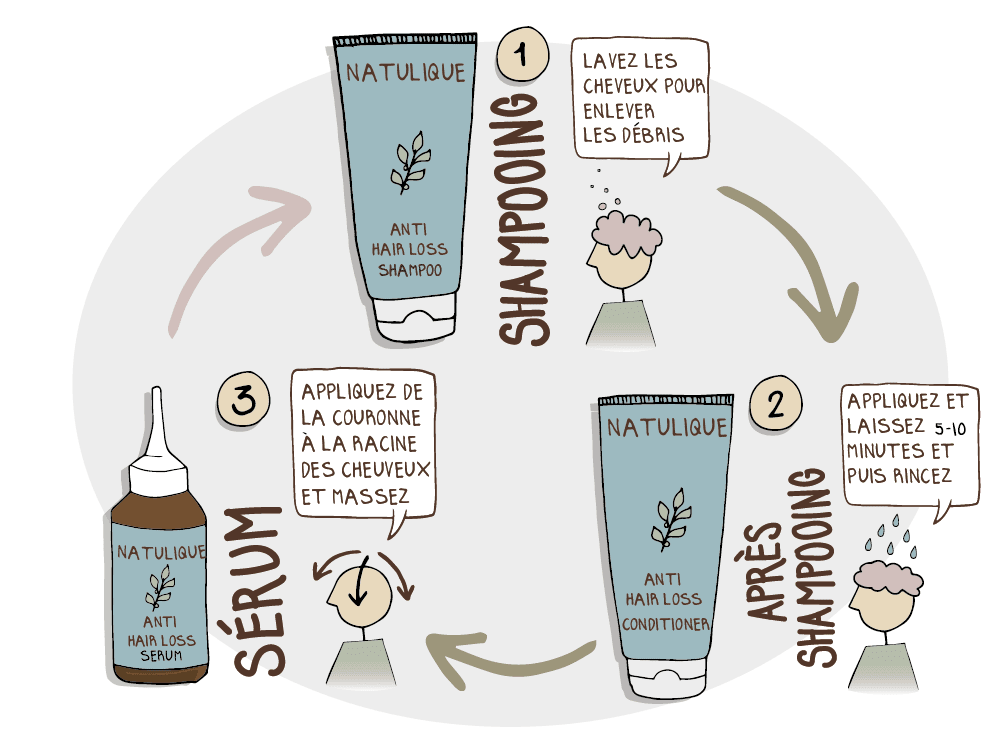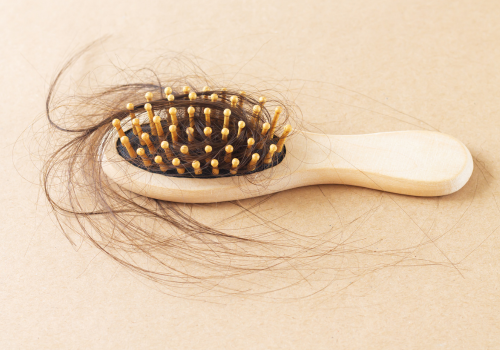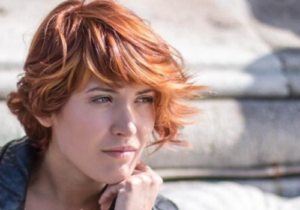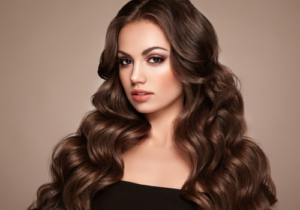Hair loss is a problem that affects many people around the world. There are a number of causes, whether genetic, environmental or linked to health problems, that can explain this condition. Understanding these causes is essential to finding appropriate and effective solutions. In this article, we'll explore the different causes of hair loss, and how best to treat them.
Genetic causes of hair loss
Androgenic alopecia
How it is inherited
Androgenic alopecia, also known as male pattern baldness, is the most common form of hair loss. This type of hair loss is generally hereditary, and is passed down from generation to generation. The genes responsible can be inherited on both maternal and paternal sides. Individuals with a family history of baldness have a higher risk of developing this condition.
How to treat it
Treatment for androgenic alopecia can include both medical and surgical options. Among medical treatments, drugs such as minoxidil and finasteride are often used to slow hair loss and promote regrowth. Minoxidil is applied directly to the scalp, while finasteride is taken in pill form. For more advanced cases, hair transplants may be a viable solution. Hair transplants involve transplanting hair follicles from a donor area to a bald or thinning area.
Natural aging
How it affects hair growth
As we age, it's natural to notice a reduction in hair density and quality. Hair follicles, which are responsible for hair growth, can become less active, producing thinner, fewer hairs. This process is known as miniaturization of hair follicles. As hair ages, it can also become more fragile and brittle, contributing to an appearance of reduced volume.
Treatments and solutions
Although aging is a natural process, there are steps you can take to improve the health and appearance of your hair. Using shampoos and conditioners specially formulated for aging hair can help nourish and strengthen hair fibers. In addition, treatments such as hair serums and moisturizing masks can improve hair elasticity and shine. In some cases, more advanced treatments such as laser therapy or platelet-rich plasma (PRP) injections can be used to stimulate hair growth and improve overall scalp health.

Environmental factors leading to hair loss
Stress and emotional shock
How stress affects hair growth cycles
Stress is a major factor that can strongly influence the health of your hair. When the body is subjected to severe stress, it releases hormones such as cortisol, which can disrupt hair growth cycles. Under normal circumstances, hair grows, remains in a resting phase, then falls out before the cycle begins again. Intense stress can push a large proportion of hair into the shedding phase prematurely. This phenomenon is often referred to as telogen effluviumwhere significant hair loss is observed a few months after a stressful event.
Stress management techniques and treatments
To minimize stress-induced hair loss, it's crucial to adopt effective stress management techniques. Here are some recommended methods:
- Meditation and yoga: These practices can help reduce stress levels and restore hormonal balance.
- Regular exercise : Exercise releases the feel-good hormone endorphins, which can reduce stress.
- Cognitive-behavioral therapy (CBT) : This form of therapy can help identify and modify negative thought patterns that contribute to stress.
- Soothing hair care : Use hair care products formulated to soothe the scalp and strengthen weakened hair.
Diet and nutritional deficiencies
Essential nutrients for healthy hair
A balanced diet is essential for healthy hair. Several nutrients play a key role in hair growth:
- Protein : Hair is mainly made up of the protein keratin. Insufficient protein intake can lead to weak, brittle hair.
- Vitamin D : This vitamin helps activate hair follicles. Deficiency can lead to hair loss.
- Iron : Iron is essential for transporting oxygen to hair follicles. Iron deficiency can lead to anemia, which is often associated with hair loss.
- Zinc : This mineral plays a vital role in tissue repair and hair growth. A lack of zinc can lead to hair weakening.
- Omega-3 : Omega-3 fatty acids nourish the hair follicle and promote healthy hair growth.

Food supplements and diet modification
When nutritional deficiencies are identified, specific solutions can be implemented:
- Vitamin and mineral supplements : Dietary supplements can fill the gaps. For example, biotin, vitamin D, iron and zinc supplements are often recommended to promote healthy hair.
- Nutrient-rich diet: Eating a balanced diet rich in essential nutrients is crucial. Eggs, oily fish, fruits and green vegetables, as well as nuts and seeds are excellent sources of hair nutrients.
- Adequate hydration : Good hydration improves blood circulation to the hair follicles, supporting hair growth.
- Consultation with a dietician: A professional can provide personalized advice on specific nutritional needs and recommend a suitable diet.
By understanding these environmental factors and applying appropriate treatments, you can effectively manage and reduce hair loss.
See also: Is cetearyl alcohol bad for your hair?
Health problems and hair loss
Hormonal imbalances
How hormones influence hair growth
Hormones play a crucial role in regulating hair growth. Hormonal imbalances can cause a variety of health problems, including hair loss. For example, an overproduction of androgens, male sex hormones present in both men and women, can lead to hair loss. In women, conditions such as polycystic ovary syndrome (PCOS) can cause a rise in androgen levels and, consequently, hair loss. Hormonal fluctuations during pregnancy, menopause or due to hypothyroidism can also affect hair density and quality.
Medical and lifestyle solutions
Tackling hair loss linked to hormonal imbalances often requires a multidimensional approach. Here are some solutions:
- Medical consultation : It is essential to consult a healthcare professional for an accurate diagnosis and appropriate recommendations. Blood tests can be performed to assess hormone levels.
- Hormonal treatments : Hormonal therapy can help regulate hormone levels. For example, anti-diabetic drugs such as metformin are often prescribed for PCOS, while thyroid hormone treatments can be used for hypothyroidism.
- Topical medications : Drugs such as minoxidil can be used to stimulate hair growth despite hormonal imbalances.
- Lifestyle changes : Adopting a healthy lifestyle can also help balance hormones. A balanced diet, regular exercise and stress reduction are essential.
- Phytotherapy : Certain herbs, such as saw palmetto and licorice root, are known for their ability to block androgens and can be used in the form of dietary supplements.
Scalp diseases and infections
Common infections and their effects on hair
The scalp can be affected by a variety of infections and diseases, each with a different impact on hair health. Fungal infections, such as ringworm, can cause circular bald patches and severe scalp itching. Folliculitis, an infection of the hair follicles caused by bacteria, fungi or viruses, can lead to red, painful pimples, causing temporary hair loss. Dermatoses such as psoriasis and eczema can also affect the scalp, causing flaking, itching and, in some cases, hair loss.
Medical treatments
Treatments for scalp diseases and infections are varied and depend on the underlying cause:
- Antifungals : For fungal infections such as ringworm, creams, shampoos and oral antifungal medications may be prescribed.
- Antibiotics : In the case of bacterial folliculitis, antibiotics may be required, either in the form of a topical ointment or oral medication.
- Corticosteroids : For autoimmune conditions such as psoriasis and eczema, topical corticosteroids can reduce inflammation and itching.
- Phototherapy : Often used for scalp psoriasis, this therapy involves exposing the scalp to ultraviolet light under medical supervision.
- Specialty care products : Using shampoos and treatments specially formulated to treat scalp conditions can help alleviate symptoms and promote healthy hair.
By understanding and treating hormonal imbalances as well as scalp and skin disorders

Inappropriate hair care products and practices
Excessive use of chemicals
The effects of chemicals on hair
Excessive use of chemicals such as colorants, relaxers and perms can have a detrimental effect on hair health. These substances can damage hair structure, making hair more fragile, brittle and prone to falling out. Chemicals can also dry out the scalp, causing irritation and inflammation that can worsen hair loss.
Natural alternatives and restorative treatments
To minimize the damage caused by chemicals, it's advisable to opt for natural alternatives. Plant dyes, essential oil treatments and homemade hair masks are all solutions that can help protect and revitalize hair. What's more, it's important to limit the frequency of chemical treatments and opt for gentle hair routines.
Styling and hairstyling
How tight hairstyles affect hair follicles
Tight hairstyles, such as braids, buns and ponytails, can put excessive pressure on hair follicles, leading to a condition known as alopecia traction. This hair loss is due to the constant tension exerted on the hair roots, which can damage the follicles and lead to their weakening or death.
Alternative hairstyles and preventive care
To avoid alopecia traction, we recommend opting for looser, less restrictive hairstyles. Avoid forceful pulling of the hair when styling. It's also important to change hairstyles regularly to give hair follicles time to recover. Use soft accessories, such as fabric elastics and metal-free clips, to reduce tension on the hair.
Styling habits and use of heat
The consequences of excessive heat
Frequent use of heated appliances such as hair dryers, straightening irons and curling irons can seriously damage hair. Excessive heat can dry out hair, making it more fragile and prone to breakage. Repeated application of heat can also degrade the hair's protective cuticle, leading to increased porosity and hair loss.
Heatless styling techniques and thermal protection
To protect hair from heat damage, it's essential to reduce the frequency of use of heated appliances. Opt for heat-free styling methods such as rollers, braids and buns to create curls or volume. When heat appliances are unavoidable, always apply a heat protector to minimize damage. Also, set appliances to lower temperatures to reduce the impact of heat on hair.
FAQs
Q : Can hair loss be temporary?
Yes, some causes of hair loss, such as stress or nutritional deficiencies, can cause temporary hair loss that can be reversed with the right treatments and lifestyle changes.
Q : Are natural products effective against hair loss?
Yes, natural products like essential oils, hair masks and herbal tinctures can benefit the scalp and improve hair health, helping to slow hair loss.
Q : Can scalp massage stimulate hair growth?
Yes, scalp massage can improve blood circulation, which can promote better nourishment of hair follicles and potentially stimulate hair growth.




